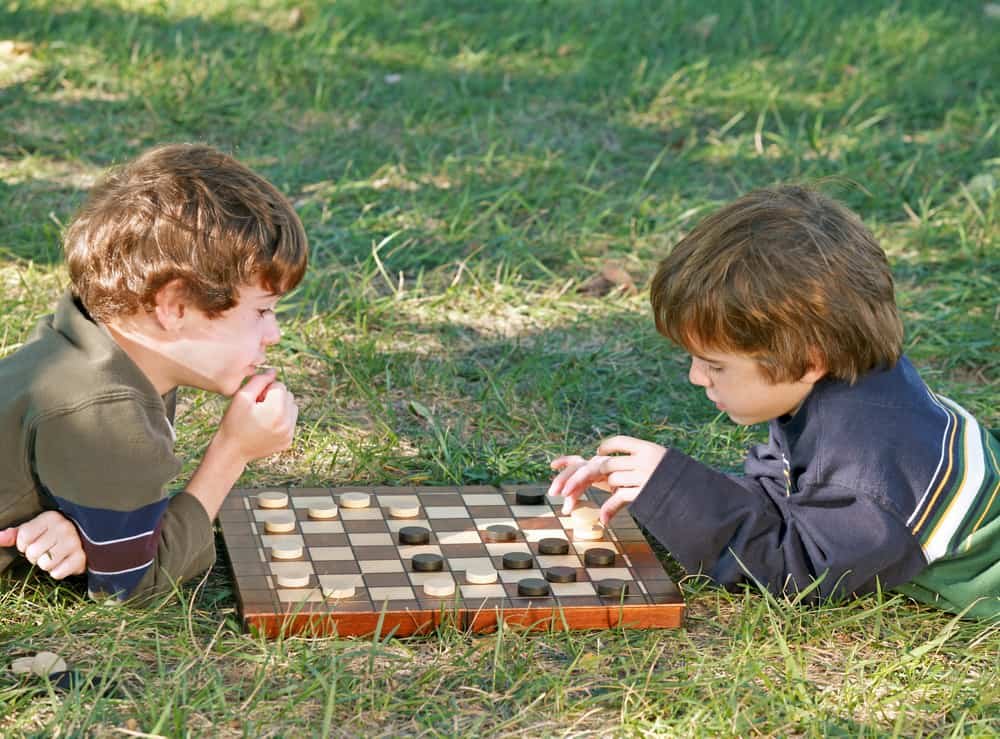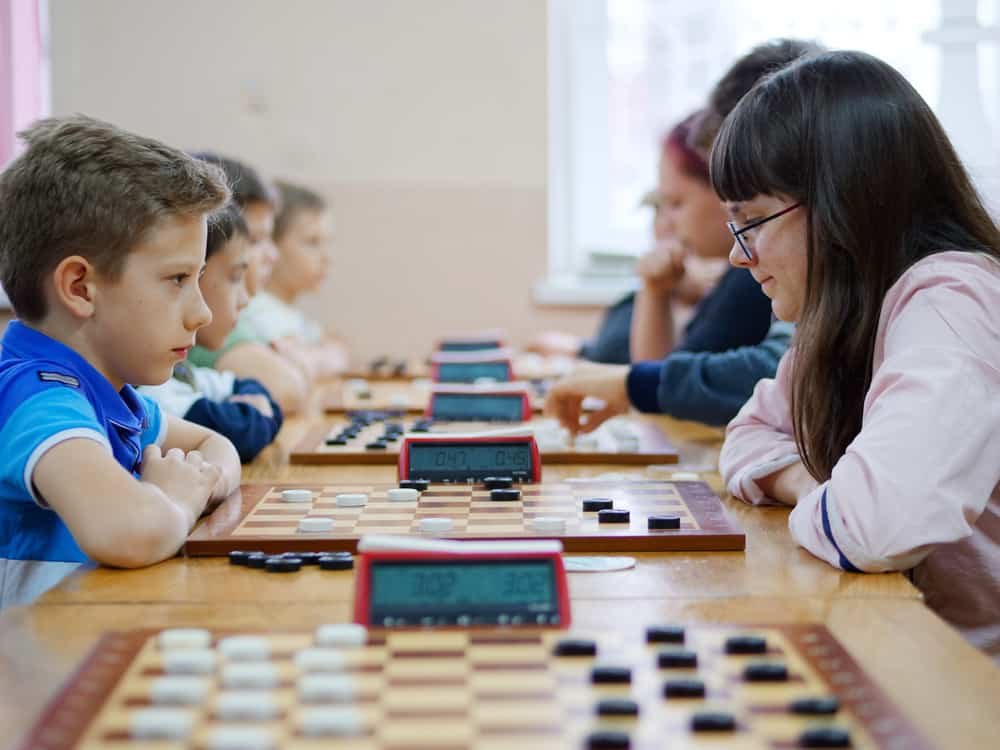Last Updated on January 7, 2024 by Gamesver Team and JC Franco

As someone who plays Checkers almost compulsively, it is natural for me to tell people “your kids should play Checkers”, but is there any real value behind these words? Am I giving sound advice to those around me, or am I just assuming that something I enjoy so much must be good for other people?
To give more value to those words, which I find myself saying over and over, I decided to look into the benefits of Checkers for kids. I must admit that I was pleased with what I discovered!
Kids are typically willing to try anything if you get actively involved with them. Don’t just throw a Checkers board and pieces at them and expect them to be intrigued. You need to do it properly. If you introduce kids to a Checkers board, make sure that you emphasize the amount of fun that they can have, and take the time to teach them the rules carefully and thoroughly. Playing Checkers is not just about winning. It’s a process to be savored and enjoyed, so play it with them – you too can benefit from playing the game!
Read on to find about the various reasons (and benefits) why kids should play Checkers.
These are 12 reasons why kids should play Checkers:
1. Playing Checkers helps develop focus and concentration.

When playing Checkers, kids should not be distracted by other things. They need to focus on the game and watch each move in action so that they can make their next move with confidence. If they do not see where their opponent has moved to, they may compromise their win. As such, Checkers teaches children to ignore distractions and focus on concentrating on the game. These skills can prove valuable in other areas of your child’s life.
2. Checkers teaches kids to trust their own judgment.
Kids, who are hesitant or lack confidence when making decisions, usually struggle to trust their own judgment. Playing Checkers can help children to change the way they think about their own capabilities. Every move that a child makes on the board that positively affects the end result is a confidence booster. The more a child plays, the more they will learn to trust their own judgment.
3. Playing Checkers makes problem-solving easier.
When kids are playing Checkers, there is always a problem to be solved. The problem is only completely solved when the game is won. When playing Checkers, your child’s brain is put to work. It needs to think actively, consistently, and quickly throughout the game. This type of thinking process, with the objective of solving the problem at hand, will provide your child with valuable problem-solving skills early on in life.
4. Checkers requires and teaches patience.
A game of Checkers cannot be rushed through. It takes a bit of time. If children are impatient, encourage them to get involved in a few games of Checkers. The steady pace paired with the active thinking process and the win at the end will teach your child how to be patient, as well as the value of patience.

5. Checkers teaches about winning and losing.
Children often learn a very hard lesson when they lose or fail for the first time. Checkers is a game of planning, forethought, and strategy. If a child acts quickly without thinking it through, they may make mistakes and end up losing the game. When a child loses, it is important for him/her to be taught to celebrate their opponent’s win with them. Playing Checkers provides the perfect opportunity to teach kids about how to win and lose graciously.
6. Kids who play Checkers develop their memory recall.
In order for children to learn at school, they are taught different memory games. Memory games often include following repetitive patterns, singing songs, repeating poems, and rhymes – the list goes on. This is how the young human brain learns to remember things. If you want to give your child a head start in terms of memory recall, teaching him/her the game of Checkers is a great option. By learning the rules and learning how the pieces move, your child’s memory can get a boost. It is worth a try!
7. Checkers teaches kids to be analytical and strategic.
Before a player makes a move on the Checkers board, they have to analyze the situation and ensure that their move is not going to put them at risk. Before each move, players need to strategically consider and plan ahead. Learning to play Checkers teaches children to be analytical and strategic in their thinking from an early age. These are skills that are required throughout life.
8. Playing Checkers teaches children about impulse control.
Many children suffer from impulsive behavior while growing up. If your child has impulsive tendencies, learning a game such as Checkers can be highly beneficial. Checkers teaches children impulse control by:
- Requiring players to be patient,
- Teaching kids not to blurt out the possible moves as their opponent might not have noticed it,
- Ensuring that kids remain in the room, fully present in the current moment in order to see what their next move should be,
- Spotting possible weaknesses in their opponents’ intended moves.
9. Checkers provides healthy indoor entertainment.

Most parents might feel like they are fighting a losing battle when it comes to their kids and screen-time. While there is value in a certain amount of time in front of a screen, it is also important for your child to develop in other areas. When it is raining or cold and you do not want the kids sitting in front of the television or on their devices all day, haul out the board games and encourage them to play. Because of the thinking involved in Checkers and the steady pace it can be played at, kids often get “hooked” on it quickly.
10. Checkers is a game for all ages (and the whole family).
A parent once told me that she wanted to find a game that the whole family could play, but she just could not find one to suit. She would either find games that the older kids or her husband lost interest in, or she would find games that seemed too complex and “boring” for the younger kids. A great solution for this type of scenario could be Checkers.
Checkers is a game that is enjoyed by young and old. You can teach your kids to play from around 4 or 5 years of age, and it provides the perfect entertainment for a family game evening or holiday fun. Trust me – my family swears by Checkers and once you get started, yours will too.
11. Checkers can be a great precursor to learning Chess.
If you do a bit of research, you will find that many Chess clubs and pros recommend teaching kids to play Chess from the age of 6 years old, or just before. If you want to ensure that your child gets a bit of a boost at confidence, analytical thinking, patience, and concentration – which are all essential for learning Chess – teaching him/her Checkers first is a great step in the right direction. You can teach a child to play Checkers from the age of 4 years old, or just before. Checkers and Chess have various similarities, so it is a great introduction to the game.
12. Checkers teaches children about action and consequence.

A game of Checkers is not without consequence. Every move that a child makes on the board has a consequence attached to it. Some moves result in positive consequences and some result in negative consequences. Kids can only learn this by actively experiencing it. Checkers teaches children to be thoughtful and mindful of their actions as there are consequences to follow.
Start Playing Checkers with Your Children
Next time you see your kids getting too much screen time, try to introduce them to the game of Checkers. Even if your children are not into board games, you can teach them the game fairly quickly, and have a good time. Perhaps they can pass down the knowledge to their kids in the future. For my family and me, Checkers has become a family tradition, and I hope that you find enough value in it to make it your family’s tradition too.

